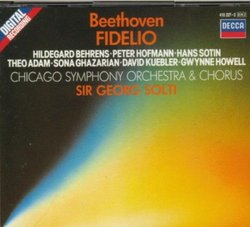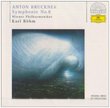| All Artists: Beethoven, Hildegard Behrens, Peter Hofmann Title: Fidelio Members Wishing: 0 Total Copies: 0 Label: Polygram Records Release Date: 3/11/1985 Genre: Classical Styles: Opera & Classical Vocal, Historical Periods, Classical (c.1770-1830) Number of Discs: 2 SwapaCD Credits: 2 UPC: 028941022721 |
Search - Beethoven, Hildegard Behrens, Peter Hofmann :: Fidelio
 | Beethoven, Hildegard Behrens, Peter Hofmann Fidelio Genre: Classical
|
Larger Image |
CD DetailsSimilar CDs
|
CD ReviewsAlthough Not The Best, A Fine Recording 03/16/2006 (4 out of 5 stars) "CAST: Hildegrad Behrens [Leonore] ** Peter Hofmann [Florestan] ** Hans Sotin [Rocco] ** Theo Adam [Don Pizarro] ** Sona Ghazarian [Marzelline] ** David Kuebler [Jaquino] ** Gwynne Howell [Don Fernando] ** Robert Johnson [Erster Gefangener] ** Philip Kraus [Zweiter Gefangerer] ** Chicago Symphony Orchestra and Chorus ** Sir Georg Solti (conductor)
ABOUT THIS RECORDING: A studio recording from the 80's, this is possibly conductor George Solti's greatest interpretation and reading of an operatic score. He trained the Chicago Symphony to resplendent results. The orchestra is both lyrical and subdued but passionate and boiling over with dramatic tension. There is a natural freshness and vitality to the music, and if this recording received its 5 star rating from me it's definately because of Solti's magnificent conducting. Many listeners object to the cast, claiming that their voices are not suited to their musical demands and considerably underpowered when compared to the casts in more famous recordings on the market. The German soprano Hildegard Behrens is not even best known for her Leonore; she is better known for her Brunhilde of Wagner's Ring operas. As Leonore, she knew that she would face tough competition- Christa Ludwig has long been hailed as the reigning interpretor, plus there are the masterful accounts by Sena Jurinac, Birgit Nilsson, Leonie Rysanek, Dame Gwyneth Jones and Jessye Norman. Behrens has a well-placed lyric voice, and I even believe she would have scored huge success had she opted to sing Italian lyrico-spinto parts like Aida, Leonora, Butterfly, instead of dramatic German parts. Her voice, let's face it, is light and underweight and this is tragic because in such moments as Leonore's impassioned "Aubscheulicher!" and "O Namelose Freude" a bigger voice is needed. It is obvious that the tessitura of this role is taxing and slaying poor Hildegard's voice, flexible as her voice may be. But with this said, she can still sing a beautiful, very feminine and extremely noble Leonore. In this respect, she is a close cousin to the Leonores of the World War II Era - Frida Lieder and Sena Jurinac. There is more than a touch of Mozartian heroine in the voice. It is a bright, lyric, radiant and angelic voice, and let's also face it: Leonore, dressed as a man as she may be, is still a woman and should be sung like a woman devoted to her husband and made strong by love. If anything, Behren's Leonore is the most "human" account and not marked by the superhuman dramatic soprano qualities that other sopranos give to the role. As for tenor Peter Hoffman's Florestan, his is possibly the worst on record. His idea to sing this role was ill-conceived. Doubtless, Solti and or this record label contracted him because he could sing with genuine chemistry and harmony opposite Hildegard Behrens. They had sung a fine Tristan and Isolde under the baton of Leonard Bernstein on a studio recording in the late 70's. Hoffman is singing a role that is out of his league. He's primarily a lyric tenor, and again, why the heck didn't he stick to singing Mozart ? When I hear his voice in this recording, singing in ensembles and arias with music closely related to Mozart, I stop to wonder how he would have fared as Don Ottavio, Tamino and or singing the Ode to Joy in Beethoven's Ninth Symphony. The role of Florestan calls for a much bigger voice. This is why the Florestans of Jon Vickers and James King have garnered greater fame and following. Next to Vickers and King, Hoffman sounds boyish and powerless. But, keep in mind, his voice is still beautiful, elegant, sophisticated and sensitive to the music. If you are really into beautiful, smaller voices, then this recording is definately for you. The others in the cast are doing better than the leads, which is sad really. Hans Sotin is a bass-baritone of great prowess and he has sung a number of amazing roles including Wagner. His dark, edgy, intense voice is perfect for the villainous part of Rocco. Everything I hear coming out of Hans Sotin's lungs is amazing. And last but not least is Theo Adam's wonderful Don Pizarro, the man who saves the day, the deus ex machina in this opera. What a voice! No wonder he was considered the greatest Wotan from Ring of the Nibelung. It is a powerful, sonorous bass voice that comes close to being God-like. It is noble. The German diction is right on target. No faults here. But again, this recording favors a beautiful, lyric sound and it's a pity that Behrens and Hoffman didn't have bigger voices. BACKGROUND OF THE OPERA: Beethoven's only opera centres on the loyalty and love of Leonora, who disguises herself as a boy, Fidelio, and takes service under the gaoler Rocco, discovering in the deepest dungeon her husband, Florestan. Don Pizarro, who holds Florestan prisoner for personal reasons, orders his secret murder, which Leonora is able to prevent as the arrival of the minister Don Fernando is announced, an event that will put all to rights again. Additional complications for Leonora include the unwanted affection for her of Marzelline, who is unaware of her true identity, and the consequent rivalry of Jaquino. Rocco, a good man who obeys orders, however unjust, may be seen as a representative figure, while the prisoners in his charge have their moment in the famous prisoners' chorus that allows them to emerge for a moment into the fresher air. The four overtures to the opera, the three earlier Leonora overtures now generally replaced by the 1814 Fidelio overture, are heard often enough in the concert-hall, in particular the third of the Leonora overtures, which anticipates the climax of the opera by the use of an off-stage trumpet heralding the arrival of the deus ex machina , Don Fernando. The prisoners' chorus, O welche Lust (Oh what pleasure), in the second scene of the later two- act version of the opera, is remarkably effective, while other vocal excerpts include the quartet for Rocco and his household, Mir ist so wunderbar (It is so wonderful for me), Leonora's horrified recitative and aria Abscheulicher! Wo eilst du hin? (Detestable man! Where are you hurrying to?) and Florestan's moving Gott! welch'Dunkel hier! (God! How dark it is here), as he lies shackled in his underground cell. While the musical influence of Mozart may be perceived, and possibly of other treatments of the subject by the composers Gaveaux and by Paer, the plot itself owes much to French revolutionary opera or "Rescue Opera" the works of Cherubini and Méhul." |

 Track Listings (11) - Disc #1
Track Listings (11) - Disc #1

